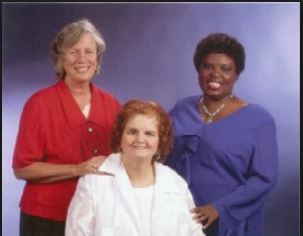 June 22nd marked the 20th anniversary of the Olmstead Supreme Court Decision: a ruling that stated that people with disabilities have the right to live in the least restrictive setting possible.
June 22nd marked the 20th anniversary of the Olmstead Supreme Court Decision: a ruling that stated that people with disabilities have the right to live in the least restrictive setting possible.
Across the country, we are still working to fulfill this promise.
The story of the Olmstead case begins with two women, Lois Curtis (center) and Elaine Wilson (at right), who had mental illness and developmental disabilities, and were voluntarily admitted to the psychiatric unit in the state-run Georgia Regional Hospital.
Following the women’s medical treatment there, mental health professionals stated that each was ready to move to a community-based program. However, the women remained confined in the institution for several years after the initial treatment was concluded.
With the help of Attorney Sue Jamieson (at left) of the Atlanta Legal Aid Society, they filed suit under the Americans with Disabilities Act (ADA) for release from the hospital.
On June 22, 1999, the U.S. Supreme Court held in Olmstead v. L.C. that unjustified segregation of persons with disabilities constitutes discrimination in violation of the ADA.
The Court held that public entities must provide community-based services to persons with disabilities when:
- Such services are appropriate;
- The affected persons do not oppose community-based treatment and
- Community-based services can be reasonably accommodated.
The Supreme Court’s decision reflects two judgments:
First, institutions perpetuates stereotypes that people with disabilities are “incapable of or unworthy of participating in community life.”
Second, “confinement in an institution severely diminishes the everyday life activities of individuals, including family relations, social contacts, work options, economic independence, educational advancement, and cultural enrichment.”
Olmstead clearly opened the door for people with disabilities and their families to demand a full range of community-based services.
As advocates, it is our job to make sure that all people have the freedom to walk through any doors in life and seize opportunities to fulfill their dreams.










